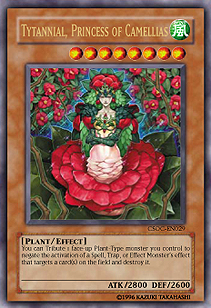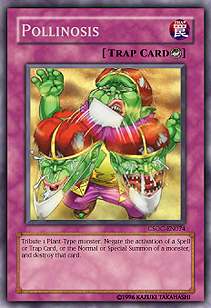This week we’ll be looking at a deck that recently saw a big jump in popularity. Very few decks have the ability to control the speed of the game with the ease of Plants, and within this deck lies the undying dedication of control players. There is no one turn KO fast enough, super secret ultra-duper special rare Dragon card big or shiny enough, nor any beat down deck aggressive enough to dampen the legacy of counteracting strategies in Yu-Gi-Oh! players. In fact, all that only makes control more fun to play. And Plants are just the deck to control the format.
We’ll be discussing the strengths and weaknesses of the Plant archetype, specifically a Black Garden variant of the deck. The inspiration for this deck relies heavily on the groundwork lain by Jerome McHale, with some consideration in making it cheaper and changes researched by a range of other innovative players.

The Monsters
Dandylion offers quick access to the central theme of the deck, and is in a sense definitive of the archetype. Slow down the game, and use a combination of negation and aggression to win. Dandylion helps with the first part of this strategy, by generating tokens and clogging the field. It also allows for quick tributes for effects.
Nettles offers the deck a way to generate Synchros, which can end a game rather quickly. It also limits your opponent’s options. With a decent 1200 ATK, it can handle many monsters if Black Garden is in play. And if the Garden is in play, you’ll be able to keep Nettles on the field. Limiting your opponent’s options is the key to a control strategy; Nettles does that while offering a way to generate large monsters as well.
Our other game ending monsters are Tytannial and Gigaplant. Tytannial limits options like almost no other card. Tribute a Plant to negate any spell, trap, or monster effect as long as that effect requires a target, and with 2800 ATK, your opponent won’t have much time to get rid of her. Gigaplant allows quick special summons, which can be a huge benefit in this deck. In the middle to late game, Gigaplant might be the best option. You can load the field and play a copy (probably at least your second) of Black Garden. At that point, there’s very little chance your opponent can come back.
Lord Poison offers both a great way to clog up the field, and take advantage of the late game when both player’s cards are depleted. Botanical Lion is a quick game ender, and offers a way to clear your opponent’s field without expense. Play this monster first, and then activate Black Garden. It quickly becomes a near unstoppable force. There isn’t much to say about Lonefire Blossom. Before Black Garden was released, it made the deck. You can tribute a token to special summon any Plant monster. There just isn’t much about this card that isn’t good.
Cyber Valley, a card McHale brought to the archetype, offers another way to abuse the tokens this deck generates. As with so many cards here, it also serves the dual purpose of slowing the game down.
The Spells
Almost half the spell lineup is either a copy of Black Garden or Terraforming. Black Garden elevated Plants to a new level, from a combo deck to a viable control strategy. It slows the game down to a halt, granting you quick access to the means to simply run over Dark Armed Dragon, while generating tokens to pay for the overpowered effects of your cards. In almost any other archetype, many of the cards in this deck are too costly. Most players would rather pay half their life points than tribute a monster for the activation of Solemn Judgment, but Plant players are granted easy access to tributes.
Playing multiple continuous spells can be a terrible choice for a deck. Where other strategies play a monster and a trap to protect it, continuous spells often tempt players to play a monster and the defensive trap, while also activating one or even two other spells. This leaves you open to a game-shifting activation of Heavy Storm. However, Plants not only have access to the three copies of Solemn Judgment that most decks have, but also three Pollinosis to protect your control over the game.
Mark of the Rose is a quick answer to almost any problem. Take your opponent’s monster, activate whatever effect it has, and use it to summon a Synchro monster. It allows for quick game ending pushes, and disassembles so many of your opponent’s plays.
Notice the lack of Mystical Space Typhoon and Heavy Storm in this deck. The absence of Heavy Storm is easily explained by the need to keep a full back row throughout the game. However, some players throw a copy of Mystical Space Typhoon in decks like this. Remember that every slot in your deck is important. Mystical Space Typhoon serves this deck no purpose. Run 40 cards that compliment your deck archetype, not 39. Remember to keep your deck focused, especially when running an anti-meta or control deck.

The Traps
The three copies of Solemn Judgment and Pollinosis protect the continuous spells and traps of the deck, limiting your opponent’s options and maintaining the lock you put on the game. The deck ends with three copies of Phoenix Wing Wind Blast, which is notorious for slowing the game down.
Your choices in the Extra deck won‘t be too unorthodox, but you‘ll want to include at least one copy of Queen of Thorns and Gladiator Beast Gyzarus. Mark of the Rose gives you a lot of options against Gladiator Beasts. You can gear your side deck toward combating them, though the matchup isn’t the worst. Having six copies of Solemn Judgment goes a long way against Gyzarus. Against Dark Armed Dragon decks, you’ll need to put the brakes on quickly. If you can play a Solemn Judgment or Pollinosis on Destiny Draw, you’ll be a much greater favorite for winning. If you go second, you’ll want to lock the field down as quickly as possible using Rivalry of Warlords or Black Garden as fast as possible. Phoenix Wing Wind Blast activated on Destiny Hero - Malicious is a great way to put a fast kink in your opponent’s plans.
Yu-Gi-Oh! is a game most often played in a sprint, but a control deck can trip your opponent up and maintain a steady, long distance pace. When playing Plants, you’re preparing for an insurgency, not a battle. Your opponents want a quick win. By denying them that, you’re already winning. Remember to keep innovating, and bring control to another level.
-Ryan Murphy